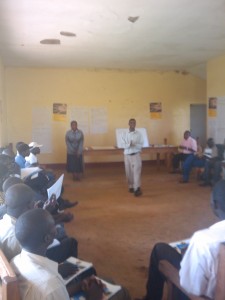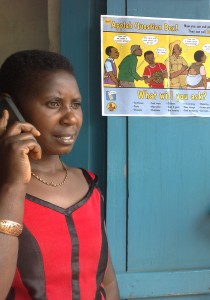Posts Tagged ‘Community Knowledge Worker’
Wednesday, March 2nd, 2011
James Amadi with his green coffee trees
Edward Chelangat, Grameen Foundation’s Kapchorwa, Uganda based field officer, sent in the report below.
“James Amadi is a farmer who uses CKW services. He has benefited from coffee tips and price information. His coffee trees are green in a dry season largely because of following CKW advice on manure application. James also said the CKW has helped him identify diseases in his coffee plantation, for example leaf rust which he though it was coffee berry disease. He sprayed orious fungicide which cleared it off.”
Tags: Agriculture, Community Knowledge Worker, ICT4D, Uganda
Posted in ICTI | No Comments »
Thursday, May 20th, 2010
In early 2009, Grameen Foundation went to Uganda with the idea of creating a fluid and effective two way communication channel between rural farmers

CKWs in training
and the world of agricultural experts, development agencies, traders and commercial players. Through this loop, rural small holder farmers would be given livelihood saving agricultural information generated by the experts and the big players would keep informed on conditions on the farm from adoption of best practices to available produce for sale. (more…)
Tags: AppLab, CKW, Communication, Community Knowledge Worker, Farming, Gates Foundation, Grameen Foundation, ICT4D, ICTI, Innovation, Mobile, research, Technology, Uganda
Posted in Africa, AppLab, Community Knowledge Worker, ICTI | 1 Comment »
Friday, November 6th, 2009
Right now we’re in a planning phase—which ultimately means we’re wrestling with the “big” challenges that become even more significant at scale. We’re building partnerships to begin recruiting Community Knowledge Workers (CKWs) in early 2010 and that has me thinking about one of those challenges: how do we ensure that female farmers have an equal opportunity to participate as CKWs and that they have the same access to services offered through the CKW channel?
In the pilot we learned that women do most of the manual labor in farming in Uganda and will often be the decision makers when it comes to adopting new agronomic techniques. Our observations also show that they’re less likely to own their own phones and to approach a male CKW. During the pilot, 33% of CKWs were women, but if we really want to reach female farmers we will need to recruit equal women and men to participate in the program and ensure that both enjoy the same benefits. So how do we do it? (more…)
Tags: Agriculture, CKW, Community Knowledge Worker, Farming, ICT4D, Mobile, research, Technology
Posted in Community Knowledge Worker | 2 Comments »
Friday, October 23rd, 2009

Calling into Question Box
During the test of concept phase of our Community Knowledge Worker initiative, AppLab Question Box (AQB) was one of the services that the CKWs provided to rural communities. Grameen Foundation worked with Appfrica Labs, and US based NGO, Open Mind, to pilot this service. AQB is a live, local language hotline service that brings the Internet and expert advice to the homes and market stalls of individuals who may never see a computer, visit an agricultural specialist, or read in English. Between April and September, villagers in Uganda’s Mbale and Bushyeni districts had access to the service to ask agricultural, education, recent events and other questions. (more…)
Tags: Agriculture, Appfrica Labs, Bushyeni, CKW, Communication, Community Knowledge Worker, Grameen Foundation, ICT4D, ICTI, Innovation, Mbale, Mobile, NARO, Open Mind, Question Box, Technology, Uganda
Posted in Community Knowledge Worker | 2 Comments »
Thursday, October 22nd, 2009
Last week in Uganda I was fortunate to attend a meeting in Busano subcounty, Mbale district, with some of the Community Knowledge Workers (CKWs) – local farmer leaders empowered with mobile applications to improve the livelihoods of their communities by distributing and collecting relevant information about agriculture – and their clients, the smallholder farmers we all seek to benefit. There was a lively discussion of the pros and cons of a variety of information services we have been testing nearby. One farmer, Elias Mabala, then stood up and spoke about how his income improved more than 100% last harvest by virtue of having greater access to market information through the CKW assigned to serve the information needs arising in his village. Stories like that explain why we come to work each day. (more…)
Tags: Agriculture, CKW, Communication, Community Knowledge Worker, Farming, Gates Foundation, ICT4D, ICTI, Innovation, Mbale, Mobile, Technology, Uganda
Posted in Community Knowledge Worker | No Comments »



